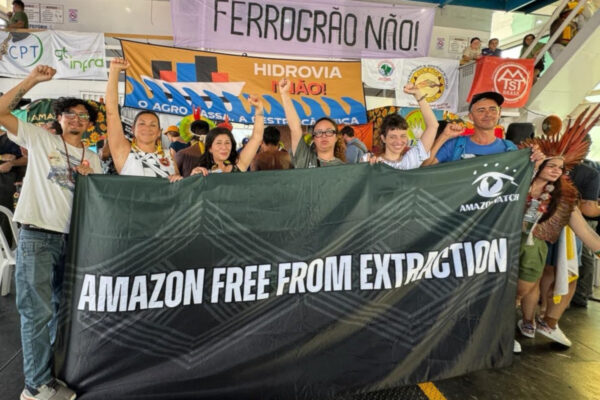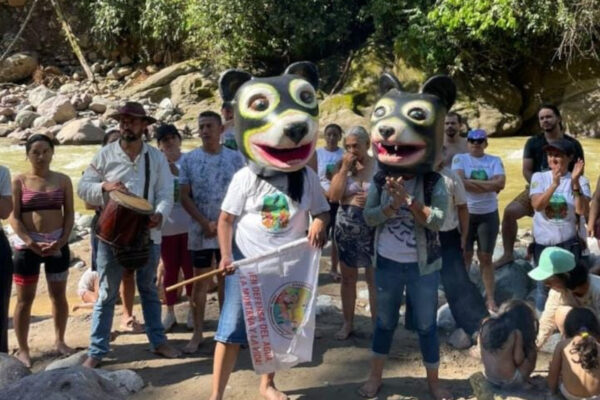At the outset of 2025, one of the world’s most significant climate victories hangs in the balance.
Over a year and a half ago, the people of Ecuador overwhelmingly voted to keep one of its largest oil reserves in the ground. This historic first will keep more than 726 million barrels of crude oil beneath Yasuní National Park – one the most biodiverse places on the planet and home to the country’s last Indigenous peoples living in isolation. It was a vote for hope, for the future, and for the protection of biodiversity and Indigenous rights.
It sets an important precedent for people-powered referendums that can be replicated worldwide. The ballot initiative was part of a national referendum, and it received 59% approval from the population of a country that was once a formal member of OPEC and where oil currently accounts for a third of its export revenue.
The referendum shuts down 246 wells currently in production, many of which have only recently come online. It thwarts the government’s ambitious plans for expanded drilling inside Yasuní, where it hoped to open 600+ wells across three oil fields known as the ITT (Ishpingo, Tambococha, Tiputini).
This victory was the result of decades of campaigning by Indigenous peoples and civil society organizations and inspired a major surge in the youth vote, who went to the ballot box in hopes of having a livable planet for themselves and future generations.
But the government and its state-run oil company, Petroecuador, continue to drag their collective feet in decommissioning drilling, undermining the will of voters, jeopardizing the country’s democratic process, and putting isolated Indigenous peoples and our planet in peril.
Delay and deception
The country’s Constitutional Court, which oversees the implementation of the referendum, gave the government a year to end oil activities, dismantle infrastructure, and remediate and restore the area. This deadline comes to an end in February, but government agencies and Petroecuador are nowhere near meeting it. Instead, they are putting mechanisms in place to obfuscate the process and delay the closure of producing wells.
Petroecuador has ignored the court-ordered mandate, arguing that it will take five years to comply. But even by its self-imposed timeline, it has failed to fulfill its promise to close ten wells by the end of 2024. Currently, there is no evidence that any more wells have been closed other than the first one symbolically retired on the anniversary of the vote last August 20.
Disturbingly, in December of last year, Petroecuador stopped reporting specific crude production from ITT wells, instead combining it with production totals from neighboring fields. This effectively obfuscates whether production in the fields is declining and if wells are actually being shuttered.
Pending decision from the Inter-American Court on Human Rights
Not only is there an urgency to implement the referendum results to respect the will of the people, but the fate of two Indigenous peoples living in voluntary isolation within and around Yasuní is also at stake. The Tagaeri and Taromenane are semi-nomadic clans of the Waorani, the Indigenous nation whose ancestral and titled territory overlaps with Yasuní National Park. Oil activities pose an existential threat to them. Every day that the implementation of the referendum is delayed, that threat deepens.
The Inter-American Commission on Human Rights (IACHR) has repeatedly handed down precautionary measures for the Tagaeri and Taromenane, calling out the Ecuadorian government for its failure to protect them by approving an onslaught of drilling projects and enabling other extractive activities like illegal logging. These claims have advanced to the Inter-American Court of Human Rights, which will render a decision in the next month. This decision could potentially shut down other oil activity beyond the ITT fields and greatly expand the no-go zone for the extractive industry.
Civil society groups filed a petition before the IACHR earlier this week denouncing the government’s failure to implement the referendum and the will of voters. They cite a decade-long slew of legal and administrative obstacles of the current and previous governments to both prevent the initial efforts to get the proposal on the ballot and their failure to implement the referendum. The complaint also cites the violation of the collective and individual rights of the Tagaeri and Taromenane, specifically the violation of judicial guarantees and political rights.
The upcoming elections could be a turning point
This February, Ecuador will go to the polls again to elect a president only a year and a half after snap elections resulted in the dissolution of Congress. Daniel Noboa, the right-wing president who assumed power then, has ushered in a new era of emergency measures in response to rising violence from narco-trafficking. Noboa’s flagrant militarization tactics have deepened state-sanctioned violence throughout the country, disproportionately impacting Afro-descendant and Indigenous communities, as well as earth defenders.
During his campaign, he openly supported keeping oil in the ground in the ITT fields. Yet since taking office, he has ensured that oil continues to flow as long as possible. Operating under the guise of national security, Noboa has weaponized narco and gang violence throughout the country to justify the delay in implementation of the referendum. In fact, last year, his administration stoked fears of further destabilization to come if national oil revenues decline, setting the stage for a possible “moratorium” on implementation.
Ecuador’s northern neighbor, Colombia, has committed to no new extraction, become a signatory of the Fossil Fuel Non-Proliferation Treaty, and joined the Beyond Oil and Gas Alliance of countries and sub-nationals implementing fossil fuel phase-out policies.
In sharp contrast, Ecuador is betting its future on more oil. Noboa and all other potential candidates in the upcoming 2025 election – with the exception of Indigenous leader Leonidas Iza – have expressed support for expanding extractive industries like oil and mining. If elected, the Noboa administration is reportedly considering expanding oil extraction into the remote southeastern Amazon along the border with Peru. This area is a roadless rainforest home to seven Indigenous nations who are adamantly opposed to drilling.
Urgent need for a just transition
Ecuador is a prime example of a country in urgent need of an equitable energy transition before the rest of its Amazon is opened up in pursuit of new fossil fuels the world can’t afford to burn.
It’s a heavily indebted country, facing a fiscal deficit upwards of US $5 billion. Oil revenue is a significant percentage of the country’s GDP. Yet, Ecuador bears little historic responsibility for the climate change crisis, despite being disproportionately impacted. The country is suffering through a global warming-induced drought that has plunged it into darkness for up to 14 hours a day as rivers and reservoirs run dry, crippling its hydroelectric system that powers much of the country.
Ecuador also faces significant barriers to a fossil fuel phase-out from global financial institutions that are heavily invested in keeping the extractive industry afloat. The Investor-State Dispute System, for example, is a draconian arbitration system that awards millions of “lost profits” to extractive companies if a country enacts or enforces environmental or rights protections that could curtail extraction, even if those guarantees are enshrined in its constitution or projects haven’t moved beyond the planning phase. Ecuador currently faces more than a dozen arbitration cases brought by the oil industry. Another barrier is credit rating agencies that downgrade a country’s rating – part of its economic lifeline – if it enacts policies detrimental to unfettered extraction, as Moody’s did to Ecuador after the Yasuní vote.
As the largest producer of Amazon crude, current production – let alone further expansion – is devastating an epicenter of biodiversity and local communities. Continued extractivism in the region is pushing the Amazon and its people further towards a tipping point of no return, with major implications for our shared world.
Failure to implement the vote to keep oil in the ground in Yasuní would set a dangerous new precedent that hard-fought climate victories, even those by way of direct democracy and the ballot box, can be thwarted by business as usual and the fossil fuel industrial complex.
Every day that drilling continues, it puts the lives of the Tagaeri and Taromenane peoples on the line. We will continue to stand in solidarity with the Indigenous and frontline communities of Ecuador organizing to usher in a new era of environmental justice in the country.














